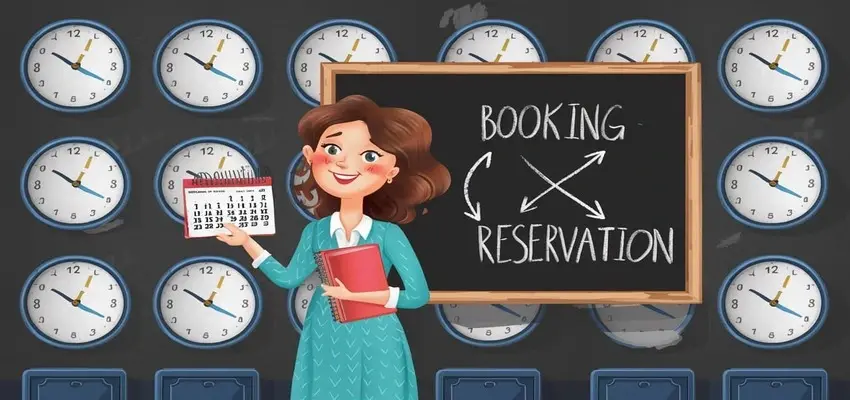What is the difference between booking and reserving?

What is the Difference Between Booking and Reserving
Booking and reserving are two similar terms that point to the act of obtaining space, thing, or service in advance for use at a later time. Nevertheless, there are certain differences involving the use of booking and reserving which offer more specific contextual connotations of when each can be employed.
Definitions
Reservation can be defined based on the advance payments that are made to ensure that a certain space, object, or service is ready for use during a certain time. For instance, making a hotel reservation, hiring an airline ticket, or hiring space for an event shows that one pays in advance to secure the space.
Booking means occupying a space, good, or service in advance with no indication of payment until the usage of that particular good or service has occurred. For instance, making a call to a restaurant to make a reservation for a table is a way of holding a table but no form of payment is taken in advance. It is also important to note that placing a hold to reserve a library study room does not necessarily require money to be advanced or paid.
Key Differences
Here are some key ways that booking and reserving differ:
Payment Status
The key difference between the terms booking and reserving is that when reserving, people are often asked to pay for the item, space, or service that is being held for them. Deposit normally in the type of advance payment is needed for the confirmation of the booking. The term reserving simply means putting a hold on particular places without having to make a deposit first.
Certainty of the Holding
Because booking involves payment, it forms a stronger commitment between the consumer and provider and thus there is a high assurance that the space, item, or service will be available at the booked time. Meanwhile, reserving is more of a tentative action and can be undone if necessary since no monetary exchange has taken place.
Customer Commitment
Booking also shows a higher level of commitment compared to the hotel since the customer has deposited some amount of money for the booking. Reserving is less rigid than traditional bookings because changes can be made as per the user's preference. Customers are less likely to have regrets about canceling a free reservation compared to when they have lost deposits or payments from the booking.
Provider Accountability
On the provider side, agreeing to take payment for a booking establishes some responsibility to fulfill what was agreed upon. Doing so offers providers more freedom in how they schedule their slots and dispose of their resources.
Timeframe
People are likely to make their bookings earlier regarding an event or a date of traveling. Bookings can be made a day or two ahead, however, bookings with shorter notice are also acceptable depending on the availability. Last minute bookings is the term used when someone books a car at the last minute, usually when they are in the car, and not a last minute reservation, where the driver finds a car at the last moment to take them where they want to go.
Indeed, many people tend to use the two terms interchangeably, but some differences can help decide when to use booking and when to use reserving. By being aware of these distinctions, readers can better distinguish between when to use booking as opposed to reserving. Some general guidelines include:
Use Booking when:
This means making payments upfront, a practice common in digital products and services, such as when a client purchases a membership to access a website or app. Confirmation of plans regarding traveling, functions, etc. Pledging wholeheartedly to dates/times There must be deposits or payments to be able to secure spots for providers.
Use Reserving when:
It allows you to check their availability without paying them first Issuing provisional hold calls Such a setting requires the ability to be flexible and adjust plans and goals as the situation demands. Being able to reserve a table in a restaurant
Common Examples
Here are some common examples that are typically considered bookings or reservations:
Bookings:
- Hotel rooms
- Airplane seats
- Event venues
- Rental cars
- Theater/show tickets
Reservations:
- Restaurant tables
- Documenting expected attendees
- Library study rooms
- Allowing courtesy holds for an account without the need to make payment
The last and most profound criterion is whether or not cash is actually in the hand to ensure the future space, product, or service. When payment takes place, make use of the booking. When it is done just as placing a hold without making payment, the term is reserved.
Booking or Reservation?
Determining whether your situation calls for a booking or a reservation depends on these key factors:
Is the structure of payment with a deposit or a part before the service is rendered followed?
If Yes then use the term booking.
Were there options for changing or even canceling these plans if the situation requires it?
If yes, then use the word reservation.
Has the availability been firmly committed?
If yes, then go for the term booking.
Could the provider then lease out the same availability to another party?
If yes, then use the term reservation.
Reflecting on these questions when discussing future intentions contributes to understanding in what contexts it is preferable to use booking or reserving.
The next time you attempt to describe holding a hotel room, concert seats, restaurant table, or any other future space, always bear these tips in mind concerning when it is right to use booking and reserving. The distinction helps avoid confusion regarding the strength of the plans and the nature of the commitments as seen from both ends of the deal.
Call us at +1 8339022090 to secure the best deals on flight tickets today. Don't miss out on unbeatable prices for your next adventure!
